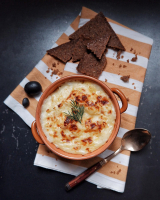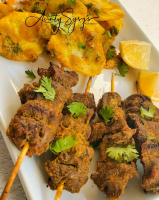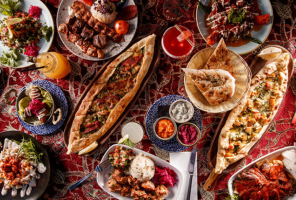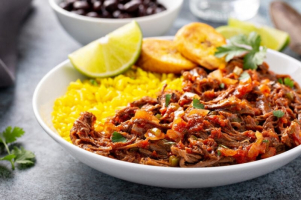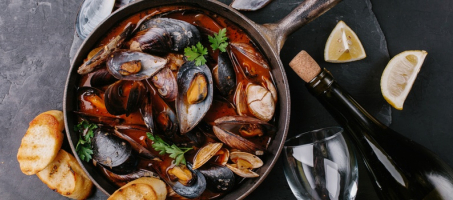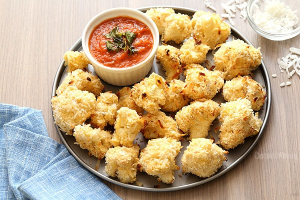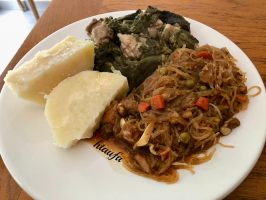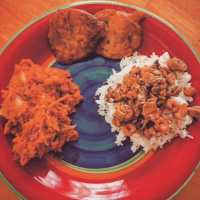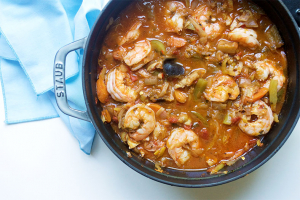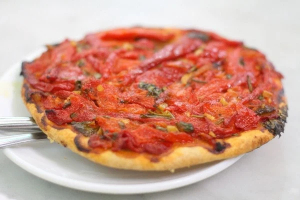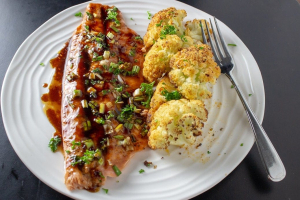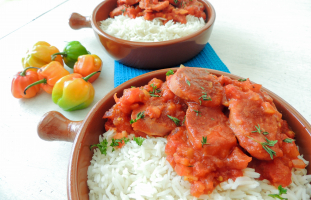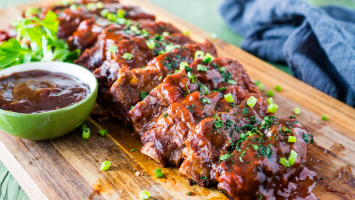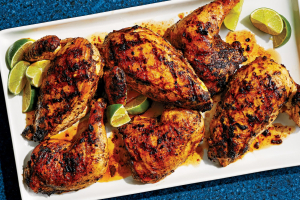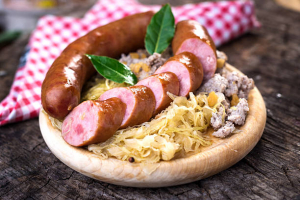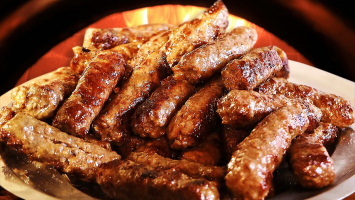Top 7 Best Bhutanese Foods with Recipe
Bhutan is one of the world's cleanest and most scenically stunning countries. There is no doubt that this country of rich culture and customs will captivate ... read more...visitors with its captivating natural wonders and exquisite culture. However, not many people are aware of the wonderful flavors that this establishment offers. Bhutanese cuisine is unlike anything else you've ever tasted. Bhutanese food will impress you whether it's the main course or the side dishes. Anyways, Toplist hopes you enjoyed this post, and if you ever have the opportunity to experience Bhutanese cuisine, please try it out. You will have a memorable dining experience.
-
Ema Datshi is Bhutan's famous dish. It is a basic stew comprised of a variety of chilies and a peculiar cheese called Datshi, which is created from yak milk. This meal can be made with potatoes (Kewa Datshi), meat, beans (Semchung Datshi), or mushrooms (Shamu Datshi). But their favorite foods are only chili and cheese! The chilies used in the Ema Datshi are quite fiery, and the meal is served over a bed of red rice, another Bhutanese staple food.
Tomatoes, butter, and cheese are used to balance off the heat in the dish. Despite this, it's difficult to eat one scoop without reaching for a glass of water. The Himalayan region is home to a rare and distinct type of cheese known as chhurpi.
Where To Eat: The Place in Chang Lam, Thimphu
Ingredients:- 10 oz. chili peppers (spicy Thai green/red chilies and jalapeño)
- 1 red onion, sliced
- 1 tomato, sliced
- 3 cloves garlic, crushed
- 1 tablespoon unsalted butter
- 10 oz cheese, grated (a combination of feta, cheddar, or farmers cheese)
- Salt to taste
- 1 cup water (to cook the veggies)
How to make Ema Datshi:
- Melt butter in a pan over medium heat.
- Combine the sliced onion, tomato, and chilies in a mixing bowl.
- Toss them in the water after a brisk toss. Season with salt and pepper.
- Cook, covered until the peppers are soft.
- Turn off the heat and stir in the cheese, allowing it to melt in the residual heat.
- Serve it with red or white rice on the side.
Notes:
- Use a variety of chilies, such as Anaheim, jalapeno, and green chilies, to create a tasty dish (Thai or Indian variety).
- Depending on your tolerance for heat, adjust the number of chilies. Remove the pith and ribs to minimize the heat quotient.
- You can use any type of cheese, but one that melts is ideal. Stringy cheeses, such as mozzarella, should be avoided. A blend of farmer's cheese, blue cheese, and cheddar would be delicious.
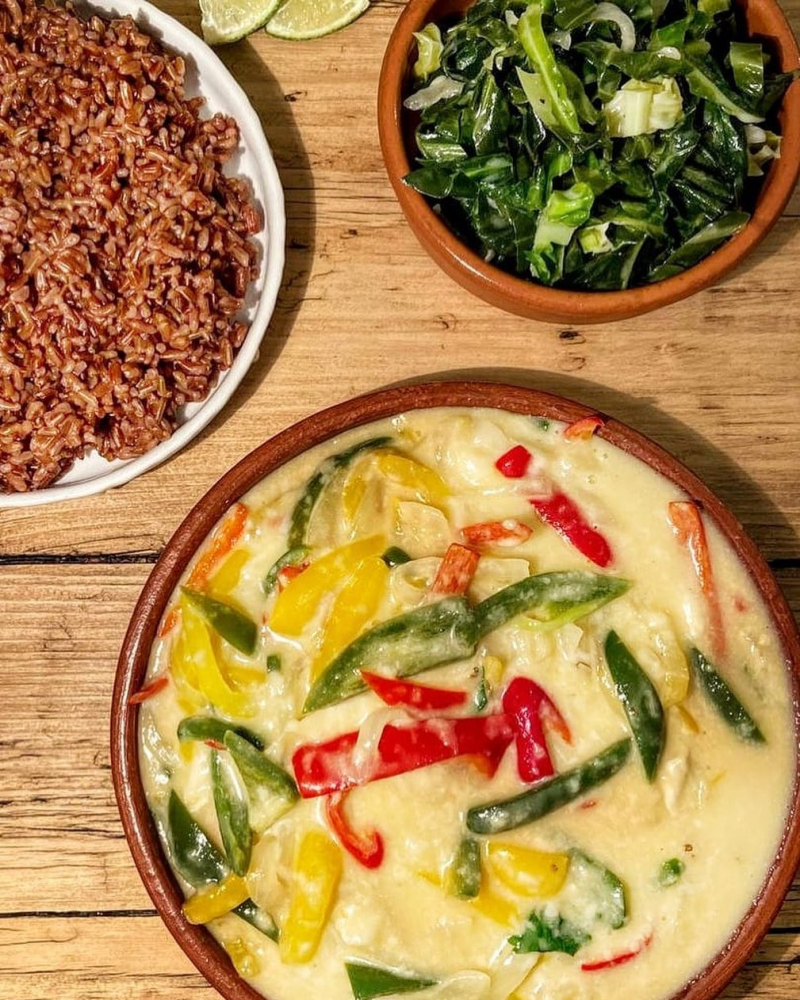
https://www.instagram.com/hungrygourmet/ 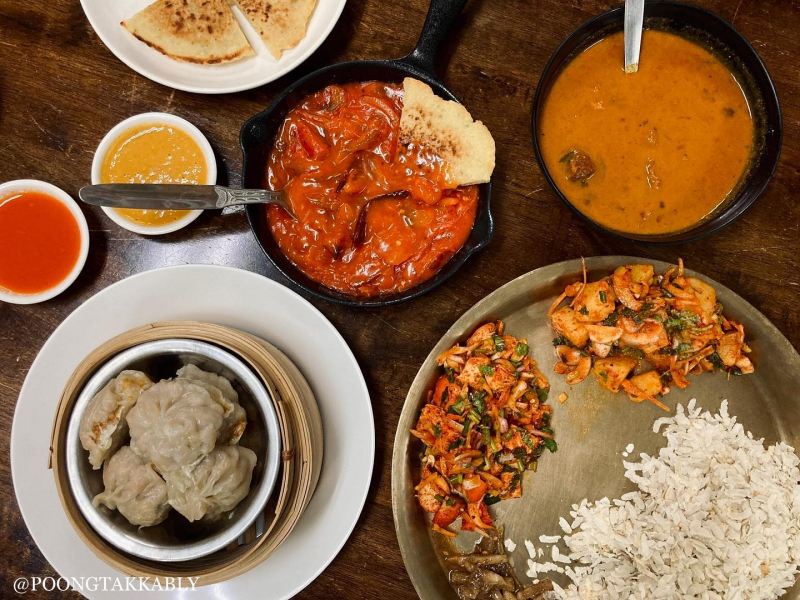
https://www.instagram.com/poongtakkably/ -
Bhutanese cuisine is generally spicy, with heavy use of dried red chilies. Shakam Paa is an enchanted Bhutanese meal made with ground beef, dried chiles, and radish. Because beef is dried and kept before being used in this meal, it is a little chewy. Shakam Paa is a great source of protein and is a mainstay of the Bhutanese diet. The practice of drying and preserving meat is also used in Bhutanese food. This Shakam Paa dish is fantastic with Bhutanese red rice.
Where To Eat: Dorji Troy Restaurant in Zangdopelri Complex, Thimphu
Ingredients:
- Sha Kam (Dried beef)
- Red dried Chili
- Raddish
- Finely chopped onion
- Tomato (optional)
- cooking oil
- salt
How to make Shakam Paa:
- Cook for around 30 minutes in a pressure cooker with 5-6 pieces of dried beef and a small amount of water (depending on the amount you are cooking the beef)
- Once the meat is adequately cooked, add the chili. It is not necessary to remove the chili stem
- Add the finely chopped onion, cooking oil, and tomato (optional) to the cooked beef
- Cut the radish into circular shapes and add it to the above combination
- Cook the ingredients with the beef for about 15 minutes, and then season with salt to taste (You can add the salt when you are mixing the ingredients).
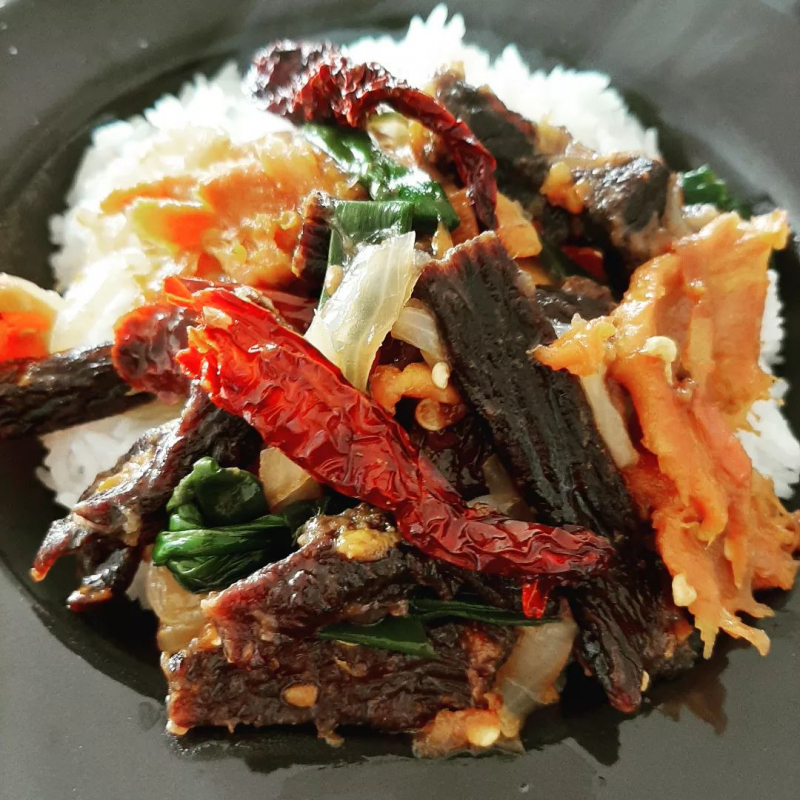
https://www.instagram.com/from_my_kitchen_for_you/ 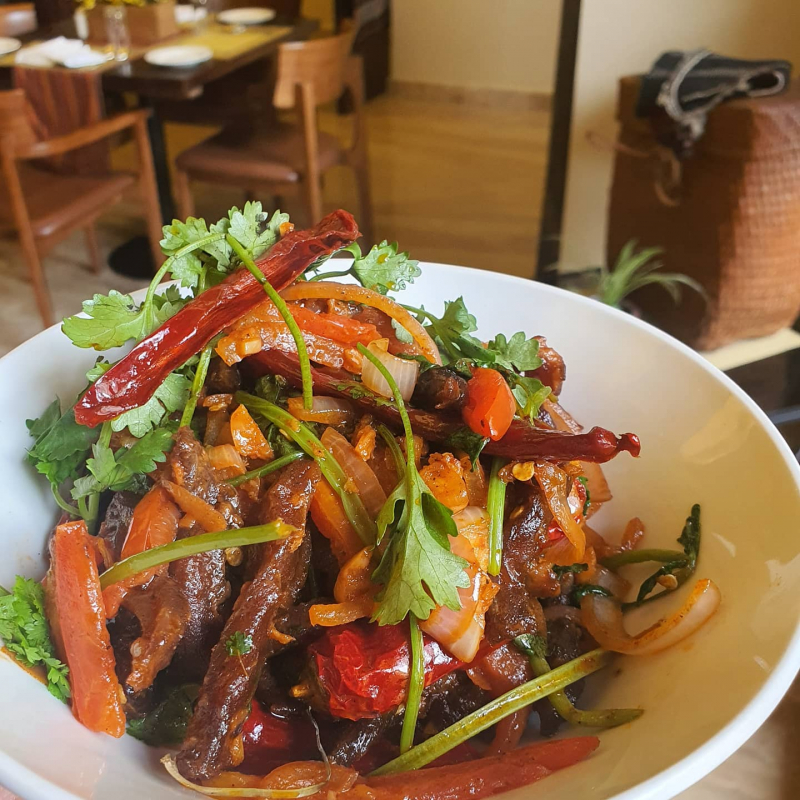
https://www.instagram.com/foodies_thepemabhutan/ -
The Jasha Maru is another well-known Bhutanese cuisine. This is a popular Bhutanese meal made with chopped chicken, garlic, ginger, chilies, and tomato sauce. This combination of components is typically eaten over red or brown rice. The meal is highly spicy, as are most Bhutanese foods because the primary distinguishing feature of Bhutanese cuisine is its spiciness.
Rice, like chili peppers, is a mainstay in many Bhutanese recipes, hence it is normal to find it alongside numerous meat dishes in Bhutan. Like any other Bhutanese delicacy, it is best served with red rice.Where To Eat: San Maru Restaurant in Norzin Lam, Thimphu
Ingredients:
- 1 ½ lb boneless skinless chicken thighs (cut into 1-inch cubes)
- 4 cloves garlic (peeled finely minced)
- 3 shallots (peeled and chopped)
- 2 Tbsp of finely grated ginger
- 1 medium-size leek (cut into slices and wash)
- 1 large tomato (diced)
- 4 red chilis (seeded if you like and cut into small pieces)
- Salt to taste
- 1 cup chicken stock
- 1 small bunch of cilantro leaves for garnish
- 2 tsp of oil
How to make Jasha Maru:
- Preheat a wok or skillet with a cover over medium heat and add the oil.
- Combine the garlic, ginger, onion, chile, and leeks in a mixing bowl.
- Stir-fry the vegetables until they are tender.
- Continue to stir-fry the chicken and tomatoes until the chicken becomes opaque in color.
- Bring to a boil with the chicken stock. Reduce the heat to low and cover with a lid to gently simmer until the chicken is cooked through.
- Serve hot with a side of steaming rice. Serve the stew garnished with cilantro leaves.
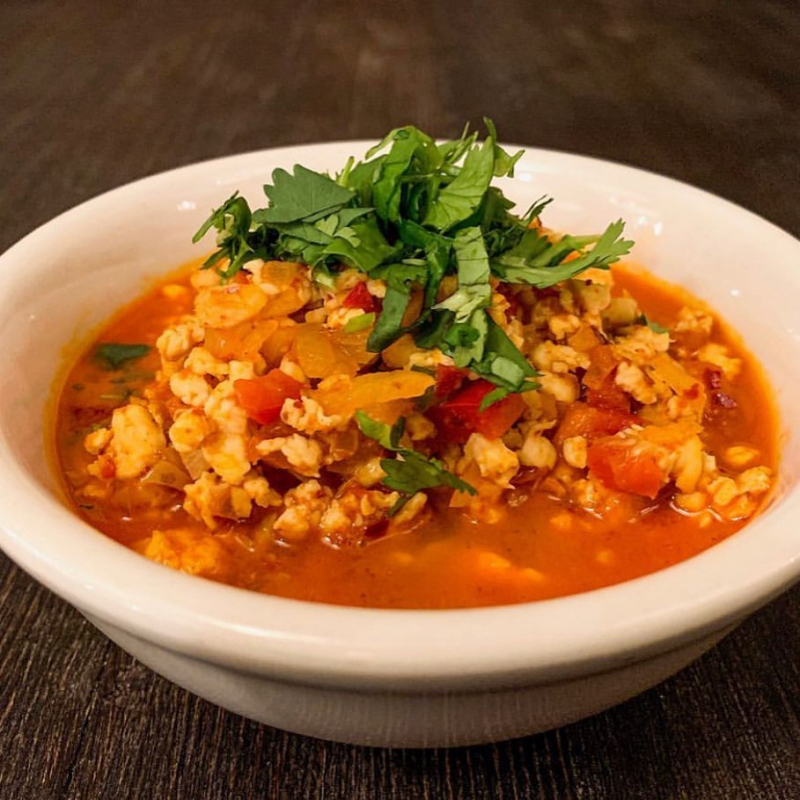
https://www.instagram.com/yak_n_yeti/ 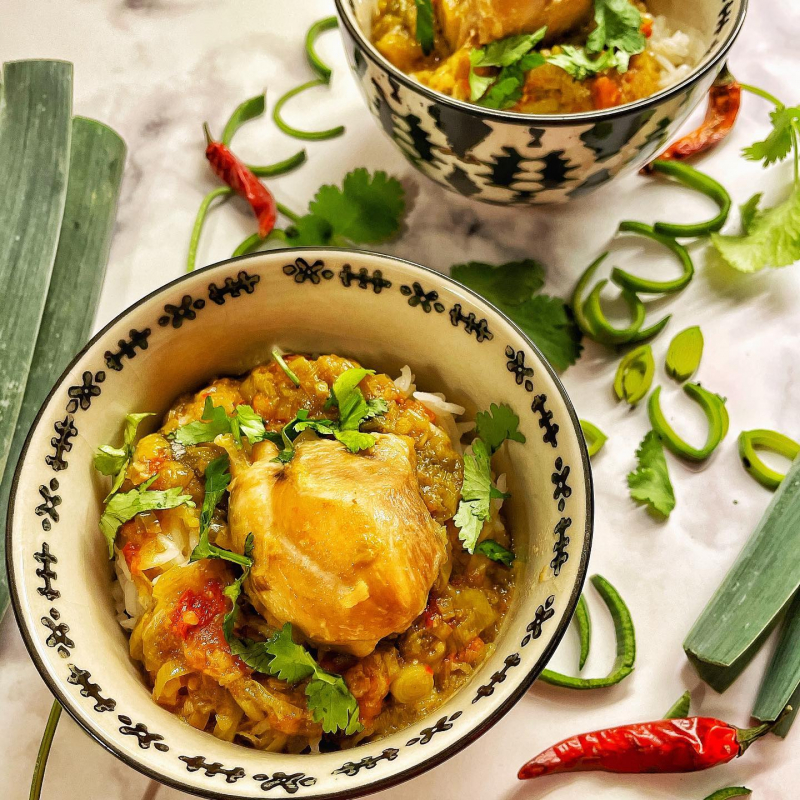
https://www.instagram.com/cuisiner.le.monde/ -
Phaksha paa is a Bhutanese dish made of dried pork with a variety of spicy red chilis. There are other variations of the dish that include items such as spinach, radish, and bok choy. For added flavor and texture, some Bhutanese cooks like to add aromatic buckwheat dumplings stuffed with greens or cheese to phaksha paa. Phaksha Paa can be served as a gravy or as a stew. Phaksha Paa is a dish made with pork that comprises a complex blend of spices and chiles as well as certain mountain veggies that are all cooked in oil or butter, while the pork is first stir-fried and then added to the dish. This is a traditional Bhutanese meal that is also served with rice.
Where To Eat: Folk Heritage Museum Restaurant in Pedzo Lam, Thimphu
Ingredients:
- 1 medium onion (about 4 ounces), peeled and coarsely chopped
- about 1-inch cube of fresh ginger, peeled and finely chopped
- 3 – 4 ounces daikon or white radish, peeled and thinly sliced
- 4 ounces unsalted butter
- 1 lb boneless pork shoulder, cut into 6-inch pieces
- ½ cup water
- 2 tbsp chili powder
- 2 tsp salt
- 3 lbs bok choy, stems removed, and leaves cut into ½-inch pieces
- 1 large fresh green chili pepper, seeded and cut into julienne strips.
How to make Phaksha Paa:
- Melt the butter in a large pot.
- Simmer the pork, onion, daikon, water, chili powder, and salt over low heat for 1 hour and 20 minutes, or until the pig is just tender.
- Meanwhile, simmer the bok choy in a saucepan of boiling water for 5 minutes, or until tender.
- Drain.
- Add the ginger, bok choy, and chili pepper to the stew and cook for 5 to 10 minutes on low heat.
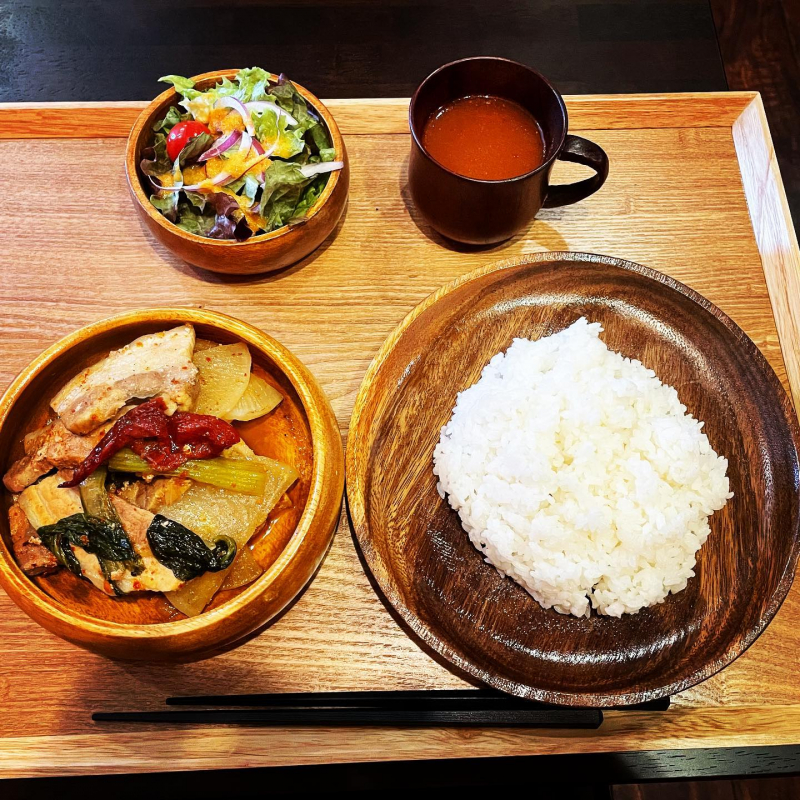
https://www.instagram.com/yasuworldpeace/ 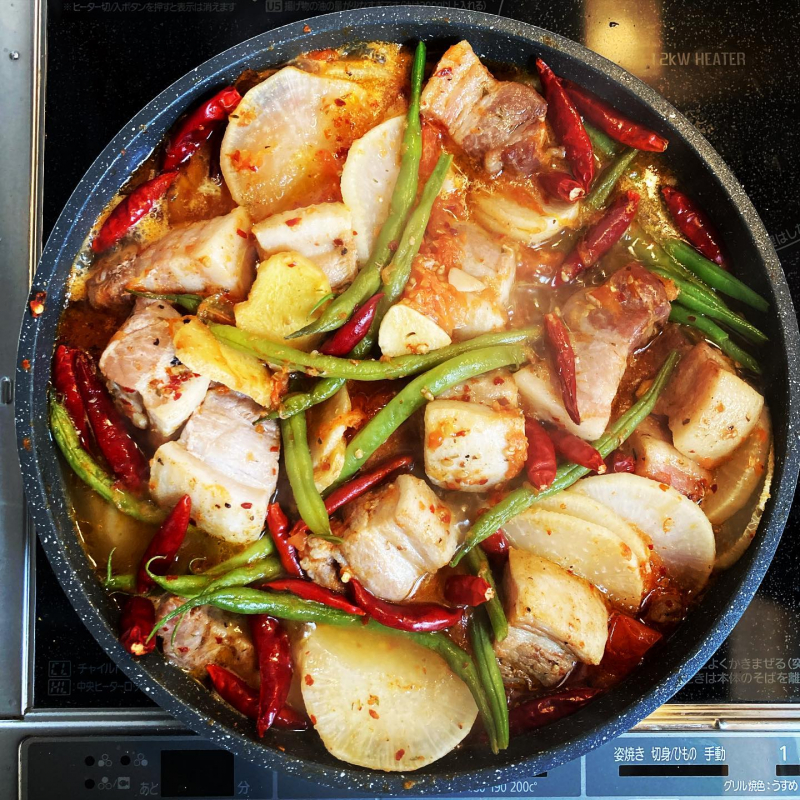
https://www.instagram.com/yamatothemachine/ -
Shakam Datshi is a version of Ema Datshi that is also popular in Bhutan. Made with dried Bhutanese beef, the cooking technique for the beef is slightly different, but the rest of the ingredients are similar to Ema Datshi. It is the cooking manner of the beef that distinguishes it from Ema Datshi. Shakam Datshi, like Ema Datshi, is finest when served with red rice.
Where To Eat: Karma Restaurant in Phendey Lam, Thimphu
Ingredients:
- 12 Bhutanese Green Chilies
- 1 medium-sized Onion
- 1 medium-sized tomato
- 3/4 cup Bhutanese local cheese
- 3/4 cup processed cheese
- 1 tbsp Butter
- Salt To Taste
How to make Shakam Datshi:
- Peel from the green chilies and finely slice them lengthwise.
- Slice the onions and tomatoes as well.
- Melt the butter in a frying pan or in a saucepan.
- Add the onions and sweat them for a few minutes. Maintain a medium heat to prevent the onions from browning.
- When the onions are cooked, add the tomatoes and simmer for another five minutes before adding the Bhutanese green chilies.
- Cook the chilies for 5 minutes before adding the local and processed cheeses. Add 2 cups of water right away and heat until the cheese has melted and produced a lovely sauce.
- The sauce takes about 10 to 12 minutes to create.
- Season with salt.
- Serve the stew hot, either on its own or with rice if you want.
Notes:
- If you don't have Bhutanese cheese, try it with feta and processed cheese instead.
- The amount of water needed is also determined by the thickness of the stew. If you want to add extra water, do so gradually rather than all at once.
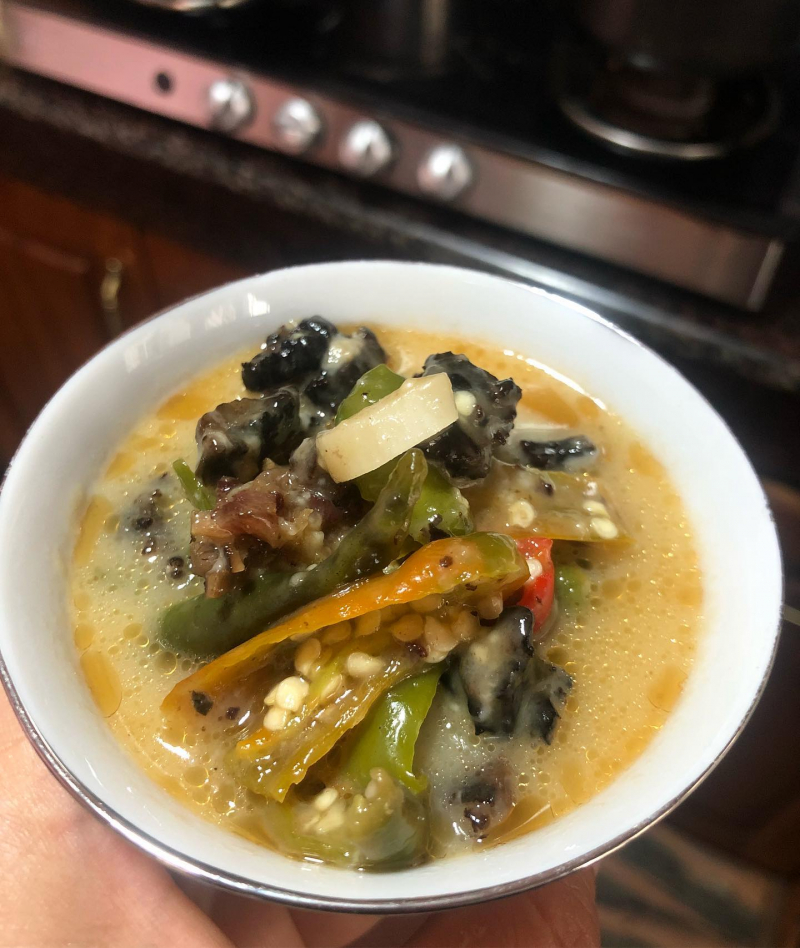
https://www.instagram.com/norlingkitchen.bt/ 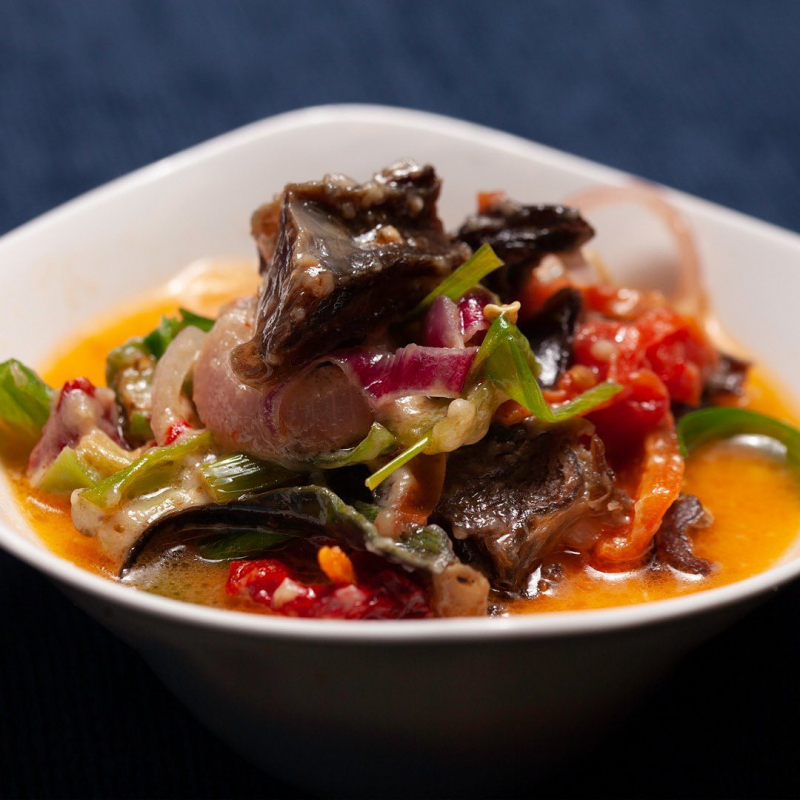
https://www.instagram.com/karma_and_her_food/ -
Dumplings, one of the most popular Asian foods, are also an important part of Bhutanese cuisine. Bhutan serves some of the best dumplings in the world, and it is recommended to eat Bhutanese dumplings. In Bhutan, many different types of dumplings are provided; depending on the filling, the dumplings can include beef, pig, cheese, and even chilies.
Where To Eat: Zombala 2, Phendey Lam, Thimphu
Ingredients:
- 1⁄2 lb yak meat or 1/2 lb beef, ground
- 1⁄2 onion, finely chopped
- 3 garlic cloves, finely minced
- 1 ounce Chinese wine (xiaoshing)
- 2 teaspoons flour
- 2 teaspoons soy sauce
- 1 jalapeno pepper, seeds removed, finely minced
- 1 (12 ounces) package wonton wrappers
- 1 few large lettuces or 1 cabbage leaf
How to make dumplings:
- Mix the ground beef, onion, garlic, xiaoshing, flour, soy sauce, and jalapeño together completely with your hands.
- Place a few wonton wrappers on a plate and pour a little bit of the filling into the middle of each.
- Fold the wonton wrapper in half and pinch the corners together to form a tight seal.
- Fill your steamer basket halfway with cabbage or lettuce leaves.
- Steam for 30 minutes after adding the dumplings (don't let them overlap).
- Meanwhile, combine the ingredients for the dipping sauce.
- Serve the dumplings hot, accompanied by the dipping sauce.
How to make the dipping sauce: mix all the ingredients including 1⁄4 cup soy sauce, 1⁄4 cup rice wine vinegar, 1 teaspoon chili oil.
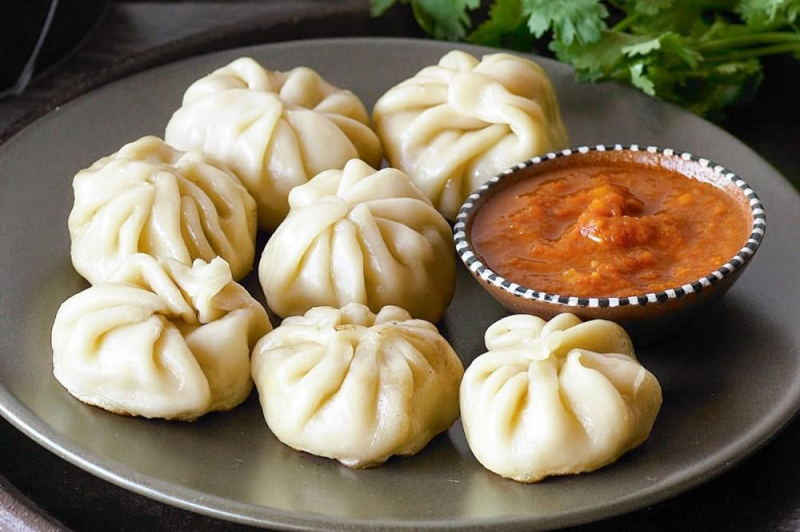
vietravel.com 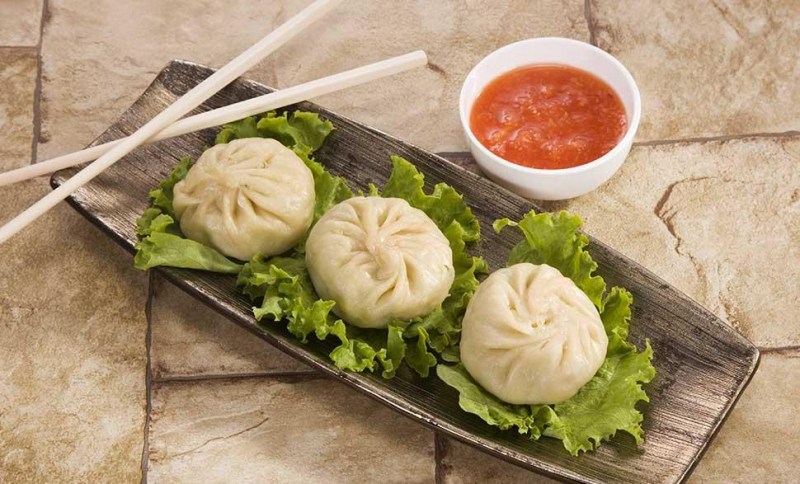
vietravel.com -
Puta, another staple food in Bhutanese cuisine, is a complete meal in and of itself. Puta's noodles are nutritious and made with bucket wheat. Puta, a rice replacement, is produced by cooking these wheat noodles with sauces, veggies, and meat. The noodles in this dish are typically boiled, but they are served stir-fried in oil.
Where To Eat: Sonam Trophel, Paro, Bhutan
Ingredients:
- 2 teaspoons active dry yeast
- ½ teaspoon sugar
- 35 grams whole-wheat flour (1/4 cup), preferably freshly milled
- 310 grams unbleached all-purpose flour (2 1/2 cups)
- 1 teaspoon kosher salt
- 2 tablespoons olive oil
How to make Puta:
- In a large basin, add 1 cup of lukewarm water, mix in the yeast, and sugar. To dissolve, stir everything together. Whisk in the whole-wheat flour and 1/4 cup all-purpose flour. Area the bowl in a warm (not hot) place, uncovered, for about 15 minutes, or until the mixture is frothy and bubbling.
- Mix in the salt, olive oil, and almost all of the remaining all-purpose flour (save 1/2 cup). Stir with a wooden spoon or chopsticks until the mixture becomes a shaggy pile. Dust with a little of the leftover flour, then knead for 1 minute in the bowl, incorporating any stray parts of dry dough.
- Place the dough on the surface. Knead for about 2 minutes, or until smooth. Cover and set aside for 10 minutes before kneading again for 2 minutes.
- Avoid using too much leftover flour, the dough should be soft and wet. (At this point, the dough can be chilled for several hours or overnight in a big zippered plastic bag. Return the dough to room temperature, knead into a ball, and continue with the procedure.)
- Refill the mixing dish with the dough after cleaning it. Wrap the bowl tightly in plastic wrap, then wrap it in a cloth. Place the bowl in a warm (but not hot) location. Allow the dough to rise for about an hour, or until it has doubled in size.
- Preheat the oven to 475 degrees. Place a heavy-duty baking sheet, large cast-iron pan, or ceramic baking tile on the lowest shelf of the oven. Punch down the dough and cut it into 8 equal-sized pieces. Make a little ball out of each component. Place the dough balls on the work area and cover with a moist towel for 10 minutes.
- Remove 1 ball (keeping the others covered) and flatten with a rolling pin. Roll out to a 6-inch circle, then an 8-inch diameter, about 1/8-inch thick, sprinkling with flour as needed.
- Lift the dough circle carefully and quickly lay it on a hot baking pan. The dough should be pleasantly puffed after 2 minutes. Bake for 1 minute more after flipping with tongs or a spatula. The pita should be light in color, with only a few brown specks. Place the warm pita in a napkin-lined basket and cover to keep the bread moist. Repeat with the remaining dough balls.
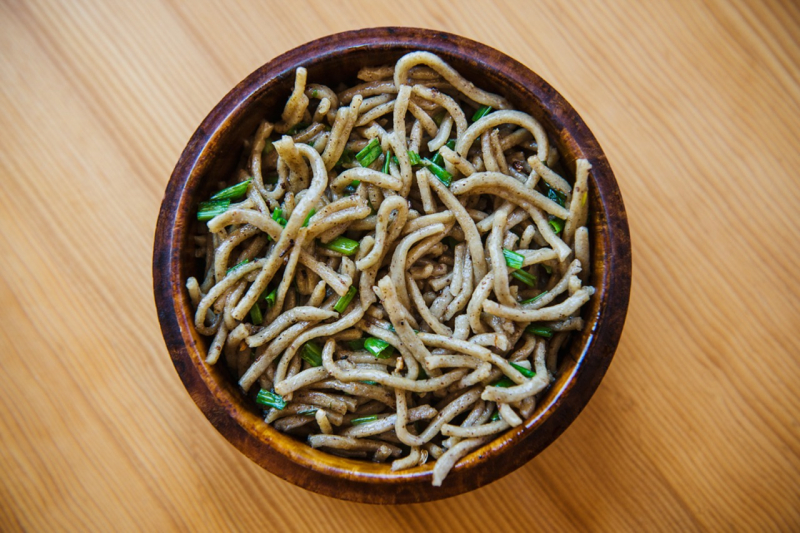
blog.mybhutan.com 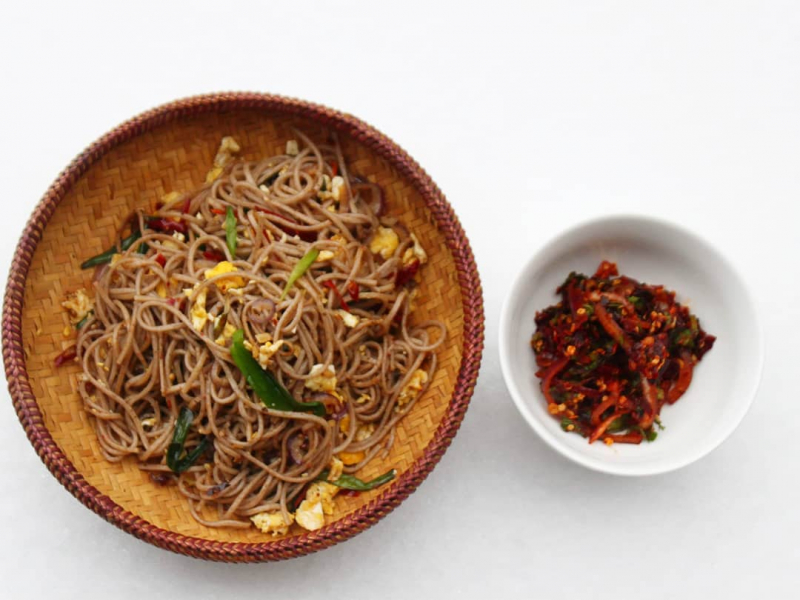
facebook.com/laya.bht/










